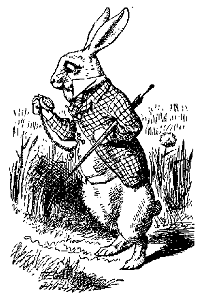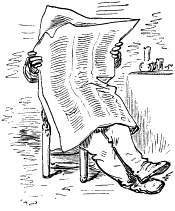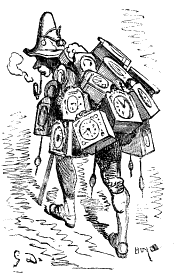|
Issue of July 5, 2006 |
 |
|
Issue of July 5, 2006 |
 |
|
Readme: OK, before I forget, here's this month's assignment: please track down every extant copy of Seals and Croft's abominable whining ditty "Summer Breeze" and incinerate it. Thank you. Those of you up for getting started on next month's challenge a bit early can begin construction of a time machine so I can go back and stop the parents (both sets) of Steely Dan from ever meeting. Speaking of truly hideous pop music, there's a diner in Pickerington, Ohio that we sometimes visit in an attempt (invariably futile, unfortunately) to recapture the magic of our beloved neighborhood diner in New York City, the awesome Cafe 82. One of the few annoying quirks of Cafe 82 was that they played a disturbing amount of Carly Simon's music, although you had to be a regular to notice the pattern. It turned out (we asked one of the owners) that Ms. Simon was also a regular, and the music was a sort of bow to her patronage. Whatever. I guess that answered the perennial question of who listens to Carly Simon music. Oddly, we never actually saw Ol' Carly eating there, although we did witness an interesting and very animated argument between Michael Moore and an unidentified woman one afternoon at a table near ours. Anyway, this diner in Pickerington also has its own sound track, although in this case it's just a local "soft rock" radio station. But every time we arrive, we seem to be just in time for some godawful syndicated show wherein John Tesh (eeewww... yes, that one) shares his "taste" in "music." That's bad enough, but (and this is truly spooky) every single time that I'm just about to take the first bite of whatever I've ordered, that horrible song that goes Sometimes when we touch, the honesty's too much comes on and I spend the next six minutes wishing I were home eating dog food straight from the can. Ironically, the otherwise ghastly Olive Garden near us, home of foam-rubber breadsticks and gelatinous linguine, plays what seems like non-stop Sinatra. Refreshing. Oh yeah, June. Fuhgeddaboudit. Updated monthly except when it isn't. Says so right on the front page. As for my mystery ailment, it's still a mystery, and I'm currently, among other things, having trouble holding things in, or typing with, my left hand. An unfortunate corollary of all this weirdness is that the book I am working on is now months late, which means that the bucks depending on it being done are months late, which means that anyone who has ever considered subscribing should do it now before I resort to sticking up gas stations out on the interstate. Lastly, this month marks my six-month anniversary of dumping Windows XP for Ubuntu Linux, and I cannot think of a single decision in my twenty years of using computers that has proven to be such a good idea. If you use Windows, check it out. As always, the circus rolls on at my blog. And now, on with the show: Bewitched, bothered and be quiet. Dear Word Detective: This is a question I often ask people at parties and get-togethers just to confuse and irritate them. As of yet, no one has been able to even hazard a guess and I'm far too lazy to do any real research into it. I would be very grateful if you could give me an answer so I can further annoy my friends and associates by smugly rubbing the answer in their faces. The question: Why are you "bespectacled" when you have your glasses on, yet "beheaded" when you have your head taken off? -- Neal, Dublin, Ireland. 
Sure, why not? We agents of the CIA (Confuse, Irritate and Annoy) have to stick together. I've noticed that it's getting harder and harder to get a rise out of our victims these days. The worst is when you pose an annoying question and the recipient stares blankly into space and mumbles "Whatever." Whatever? Where would we be if Einstein or, for that matter, Ron Popeil, had said "Whatever"? No Pocket Fisherman, no Veg-O-Matic, no Electric Food Dehydrator, that's where. Annoyance, not necessity, is the mother of invention. Fortunately, answering your question doesn't require inventing anything -- just a visit to the wonderful (but annoying) world of English prefixes. The problem with our prefixes, the little bits like "an," "de," "in" and "be" that we stick at the beginning of many words, is that they can sometimes be perversely ambiguous. "Be" as a prefix, for instance, carried the general meaning of "about" or "near" in Old English, but also spawned a whole range of related senses (which the Oxford English Dictionary (OED) divides into seven major categories). "Be" can form verbs with the senses, among others, of "all over" or "around" ("begirdle"), "about" (e.g., "bemoan," to moan or grieve about something), "to make" (as in "befoul," to make foul or dirty), and "to cover with" (as in "bedew") or "furnish with," which gave us "bespectacled," meaning to have been furnished (i.e., to be wearing) spectacles. Oddly, however, in a number of words the prefix "be" carries the meaning of "off" or "away." The OED theorizes that this sense was a development of words like "beshear," meaning "to cut all around." If you "cut all around," goes the theory, you have pretty much also "cut off" the thing, which gives us the "be" in "behead," to decapitate. If you enjoyed this column, you should definitely subscribe. Dear Word Detective: What is the origin of the word "cad," as in "He was such a cad"? What is the true definition? -- Elisa. Well, it's a matter of perspective, to a certain extent. Some women, for instance, would say a "cad" is a man who takes you to a party and leaves with someone else. Others would define "cad" as a man who takes you to the altar and leaves, a bit later, with his dental hygienist. "Caddishness" is a spectrum disorder, the scope of which includes behavior ranging from the merely rude to the downright sociopathic. It all depends on your personal threshold of outrage. Interestingly, several major dictionaries skip over one salient feature of the "cad," defining the word as "a man who acts with deliberate disregard for another's feelings or rights" (Merriam-Webster) and "a man whose behavior is unprincipled or dishonorable" (American Heritage). But in common usage today, a "cad" is a man who behaves abominably specifically towards women, not humanity in general. A man who cheats his buddies at golf may be called many names, but "cad" will not likely be among them (unless Thurston Howell III is speaking). There are, of course, other categories of male misbehavior reflected in our language, ranging from the simple "jerk" to the outrageous "bounder" and culminating in the despicable "pig." For those wishing to plumb the linguistic depths of male depravity, my book "Making Whoopee: Words of Love for Lovers of Words" (Workman Publishing, 2004) contains a handy rundown of these and other terms for less-than-ideal mates in a section entitled "Looking for Mister Won't-Hit-on-My-Sister." Call it cosmic justice or simply delicious irony, the etymology of "cad" is exactly what the critters deserve. "Cad" is short for "caddie," meaning, since the 18th century, a low-status youth, errand-boy or "gofer" (and, since the 1800s, a golfer's club-carrier). "Caddie," in turn, comes from "cadet," which is derived from the Late Latin "capitellum," a diminutive of Latin "caput," meaning "head." This made "cadet" the equivalent of "little head," but in practical use it meant, first, "younger son." "Cadet" was then applied to young men who entered the military without a commission and had to work their way up the ladder. All of this boils down to the "cad" originally being a male of low social status who (according to the prejudices of the day) lacked the social graces expected of the well-born, thus supposedly making his boorish behavior not a surprise. Today, however, "cads" can be of any class.
On the fly, right into the ground. Dear Word Detective: I was listening to a Public Radio discussion about an area school board and one of the people said "...it appears they're trying to hide something, and that's very concernful." I'd never heard "concernful" before and, being away from my standard dictionaries, looked it up in Merriam-Webster's online dictionary. It acknowledged the word existed, but wanted to charge me for seeing the definition, so I thought I'd see if you could help. I understand what the person meant, and I know that new words are created all the time, but shouldn't we be making the case for using existing words in a more precise manner? To my ear, "concernful" sounds like fingernails scraping on a chalkboard. -- Barney Johnson.  Oh, those scamps at Merriam-Webster, always with their greedy little paws out for the extra dime. The definition Merriam-Webster's Third New International (unabridged) Dictionary gives for "concernful" is "of concern." That's it. The example they give is from the late social critic Paul Goodman: "... an eyesight for concernful reality." I don't know about you, but I don't find that terribly helpful. The Oxford English Dictionary, incidentally, does not list the word. After combing through a Google search for the word, I have arrived at two general definitions for "concernful." One would be "causing concern; giving good reason for concern," as in this example from former Secretary of State Warren Christopher speaking during the first months of the G.W. Bush Administration: "We’re only three months into the new administration, but I see a concernful pattern of retreat and retrenchment...." The other sense of "concernful" I encountered occurred primarily in impenetrable (to me, at least) academic commentaries on the work of the German philosopher Martin Heidegger. Heidegger apparently stressed a "concernful" approach to the world, which I take (probably imprecisely) to mean "engaged" and "responsible." Since Heidegger wrote in German, I suspect that "concernful" in these documents is a translation of a German word. Back at the school board, I would be willing to bet that the speaker you heard meant "concernful" in the first ("causing concern") sense. It seems very possible that "concernful" was diplomatically substituted "on the fly" for something a bit more blunt (perhaps "suspicious") at the last moment. Perhaps the speaker would have preferred to say "and we are very concerned," but the sentence structure wouldn't allow it. In any case, "concernful" seems a bit too awkward and ambiguous to get a real foothold in popular usage, but we shall see.
And dismantle is where I keep my trophies. Dear Word Detective: We all know what it is to "dismantle" something. But can you "mantle" something? Where does "dismantle" come from, and why have we kept the "dis" bit but not the "mantle" bit? -- David Barker. Well, yes, you actually can "mantle" something, although most of the senses of "mantle" as a verb listed in the Oxford English Dictionary are considered obsolete or rare today. But "mantle" never meant simply the opposite of "dismantle," i.e., to "put together." The story of "dismantle" does logically begin with "mantle," but with the noun form rather than the verb. The English noun "mantle" comes from the Latin "mantellum," meaning "cloak." First appearing as "mentel" in Old English, a "mantle" was a kind of loose, sleeveless cloak worn as an outer garment over other clothing at the time. "Mantle" then went on to develop specialized meanings, including the vestments of religious orders and robes of public office. Meanwhile, however, "mantle" was also developing a wide range of figurative and extended meanings, including anything which "encloses or enwraps" something, and "a duty or position of responsibility" (from the mantel or vestments of office). The Earth's "mantle," the layer between the crust and our planet's molten core, is so-called because it "enwraps" the core. The "mantelpiece" (a variant spelling) of a fireplace encloses the hearth. The verb "dismantle" was actually borrowed from the French "desmanteller," which meant "to take a man's cloak off his back" (thus rendering him vulnerable) or, metaphorically, "to batter down the walls of a fortress." In English, "dismantle" also meant to literally divest a person of a cloak, but by 1601 was being used to mean "to strip something, especially a fortress, of its necessary equipment or defenses." Thus we arrive the modern meaning of "dismantle" -- to take something apart being likened to removing its cloak.
|
All contents Copyright © 2006 by Evan Morris.